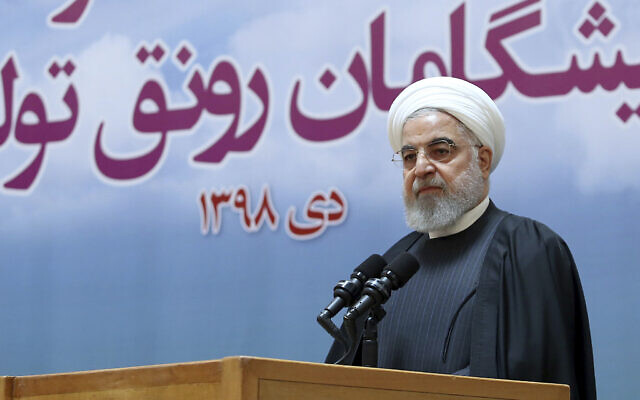Rouhani says Iran enriching more uranium than before nuclear deal

Iran’s President Hassan Rouhani said Thursday the country is now enriching more uranium than it was before a 2015 deal with world powers that was supposed to scale back its nuclear activities, and in particular enrichment.
“We are enriching more uranium than before the deal was reached,” Rouhani said in a televised speech according to the Reuters news agency. “Pressure has increased on Iran but we continue to progress.”
Rouhani also said he is working “daily to prevent war” as relations between Tehran and Washington go through a new period of maximum tension.
“The government is working daily to prevent a military confrontation or war,” he said, insisting that though dialogue between Iran and the world was difficult, it was still “possible.”
The 2015 nuclear deal, known as the Joint Comprehensive Plan of Action, or JCPOA, seeks to prevent Iran from producing a nuclear weapon — something Iran insists it does not want to do — by putting curbs on its atomic program in exchange for economic incentives.
After one of its top generals was killed in a US drone attack earlier this month, Iran announced that it would no longer respect limits set on how many centrifuges it can use to enrich uranium. Tehran said the new move was a “remedial step” in line with the deal and that it could be reversed.
In response Britain, France and Germany, the three European Union signatories to the 2015 nuclear deal on Tuesday triggered the accord’s dispute mechanism to stop Iran violating the pact and ratcheting up pressure on the Islamic Republic.
The launching of the dispute mechanism marked a last-ditch effort between the European states and Iran to resolve their differences through talks, while also starting a process that could bring back punishing United Nations sanctions on Tehran.
On Wednesday, in response to the European countries triggering the dispute mechanism, Rouhani appeared to threaten European soldiers in the Middle East.
“Today, the American soldier is in danger, tomorrow the European soldier could be in danger,” he said, without elaborating.
The nuclear agreement has been on life support since US President Donald Trump unilaterally pulled the United States out in 2018, triggering sanctions that have hurt Iran’s moribund economy, and in particular its key oil exports. Since then, Tehran has gradually rolled back its commitment to the deal, upping its enrichment actions and installing new centrifuges to speed up the process. Experts warn that Iran’s measures are reducing the breakout time it needs to produce a nuclear weapon.
Washington says the original pact was insufficient and should be renegotiated because it didn’t address Iran’s ballistic missile program or its involvement in regional conflicts. The US has said it is prepared to hold talks with Iran without preconditions, but Tehran has insisted that there be some sanctions relief before it will sit down at the table.
The current tensions between Iran and the US reached fever pitch two weeks ago with the American drone strike in Baghdad that killed the powerful Revolutionary Guard general Hassan Soleimani. The general had led Iranian proxy forces abroad, including those blamed for deadly roadside bomb attacks on US troops in Iraq.
Iran retaliated with a ballistic missile strike targeting Iraqi military bases housing US forces early last Wednesday, just before an anti-aircraft battery mistakenly shot down a Ukrainian airliner taking off from Tehran’s Imam Khomeini International Airport, killing all 176 people on board.
Read more: The Times of Israel
